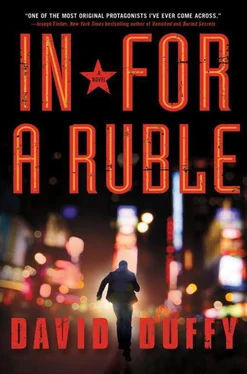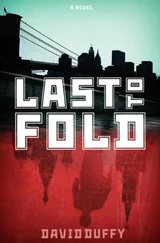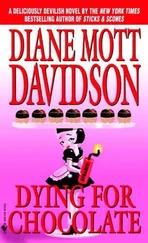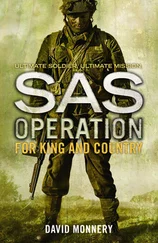For my money, Malevich is the greatest of Russian painters, one of the greatest of all painters, and along with Kandinsky, perhaps, the first real abstractionist anywhere. Leitz had placed the picture in the traditional position of an icon in a Russian house, just as Malevich himself had done with his most famous painting, Black Square, when he showed it for the first time in 1915, declaring, none too subtly, a thousand years of representational painting passé.
“Thank you. It’s my favorite picture.”
“I like the Repin downstairs too.”
He gave me a look that indicated I’d passed some kind of test. “You’re the first to recognize that. Come sit by the fire.”
Leitz led the way to a group of black leather Le Corbusier club chairs under the Motherwell. Foos lounged in one. At the other end of the room, under Kline’s big, brutal, black brushstrokes, two flat screens sat on a desk and a row of monitors were embedded in the paneled wall. They flickered with red and green and blue, too far away to see the actual numbers.
Foos poured himself a cup of coffee from a chrome thermos without waiting to be asked and lifted an eyebrow at me. I shook my head. Leitz already had a cup in front of him.
I looked from one to the other while I waited to see who would speak first. Since I was a guest, and wasn’t sure I even wanted to be here, I had no reason to get the ball rolling.
Leitz was wearing an XXL cashmere sweater, dark green, suede patches on the elbows, over a gray T-shirt, along with baggy brown corduroys that hadn’t seen an iron or press in weeks. His shoes stood out. Elegant, dark brown wingtips, English or Italian, I couldn’t tell which, well worn but freshly shined and in great shape. Foos was dressed as Foos always dresses—black sweater, black jeans, black boots. His mane of black curly hair was a little frizzed in the cold air and showing a bit of gray. He’d had a few inches trimmed for the New Year, one of his few concessions to the calendar, but it still hung thickly well past his shoulders. His black eyes looked at me from behind black, chunky glasses. His big pointed nose ran left to right from my position, and since his mouth opens mostly on the right side, it makes his whole face lopsided. He was as tall as Leitz and a few pounds lighter. Leitz’s weight settled around his middle, while Foos’s hung evenly from his shoulders, which I’ve never understood since I’ve never seen him do anything remotely resembling exercise.
I was wearing my winter uniform—black turtleneck and dark gray flannel trousers. I’d handed in my black leather jacket downstairs. I had a comfortable pair of English-made loafers on my feet that probably cost less than Leitz’s socks. In the spring I trade the turtleneck for a T-shirt, the leather and flannel for linen, and I don’t have to worry about what to put on for another six months. The injuries I’d suffered last June—some at the hands of my old friend and nemesis, Lachko Barsukov, some at my own—had healed, and I’d worked myself back into pretty good shape, despite too much vodka and beer. I was showing no flab on my six-foot, two-hundred pound frame. Since Victoria left, no one was around to complain if I was carrying extra weight, but staying in shape is a vanity like any other—and one of mine, the result of a half-starved youth when making it through the day was no better than a fifty-fifty bet. Victoria said she liked my brown eyes—they had a curious sparkle—straight-ahead nose and squared-off triangle of a chin. My hair, once bushy and black, had thinned to the point of a sixty-year-old by my late twenties, in my mind the result of the same youthful malnourishment. I’d shaved my scalp and kept it that way. Today, it was probably showing some red from the cold air outside. I hadn’t worn a hat.
Nobody said anything for several minutes, an unusual occurrence in America—or anywhere. Leitz looked at me, I looked at the paintings. Foos might have taken a cat nap. Three men, content to take silent stock. Nine times out of ten—ninety-nine times out of a hundred—someone has to fill the void. Not today. I’m used to this treatment from Foos—we can go days without much more than grunting at each other—but Leitz intrigued me by saying nothing. When he was ready, he broke the silence.
“Thank you for coming to visit. Foos told me a little of your background. You’ve had an interesting life.”
“Sounds like he’s told you more than he’s told me.” I smiled to show I meant no offense. Leitz smiled back.
“I require all of my clients to sign confidentiality agreements which my lawyers drafted expressly to prohibit people from talking about me or my business. Foos is one of the few who abides by his word.”
“With him, you didn’t need the agreement.”
Leitz chuckled. “I told my lawyers the same thing.”
Foos said, “You guys going to talk business or shall I go hang with Jenny while you get acquainted?”
“Patient too,” Leitz said. “How much do you really know about me, Mr. Vlost?”
“Call me Turbo. Only what I read in the papers, which Foos tells me not to believe.”
Leitz chuckled again.
I took the bait, maybe because the pictures had me interested. “You run a hedge fund, a family of funds, actually, with assets of some twenty billion. You’re very successful. So successful that a few years ago, you returned half the money you manage to your clients, whether they wanted it back or not. You said you couldn’t keep earning the kind of returns you and they were used to. I’m guessing that also meant you couldn’t keep charging the fees you and they were used to, which are supposed to be the highest in the industry.”
He nodded but said nothing.
“That pissed a bunch of them off, which must be a peculiarly American irony—wealthy people getting angry because someone gave them their money back.”
He smiled and nodded again. “So far, you’re very well informed.”
“You have a reputation for secrecy. Your investors have no idea what you’re doing with their money. You’re known for being mercurial, I’ve seen less complimentary terms used too. You get away with it because of the returns you generate. You’re what Wall Street calls a rocket scientist. You use your mathematical skills to make big bets in the financial markets and you’re right more often than you’re wrong.”
“That’s essentially correct, except the word ‘bets’ connotes gambling. I don’t gamble, not with my clients’ money. The markets are highly efficient, but they’re not perfect. I develop mathematical models that identify small inefficiencies. My investments count on these inefficiencies correcting themselves in time, which they almost always do. The investments are market neutral—I might go long in a convertible bond and short the underlying stock, for example—so I don’t care whether the market goes up or down.”
I heard this before. I’d also heard there’s no such thing as a free lunch. “Care to explain that little collapse back in 2008?”
He sighed the sigh of someone who’s been asked the same question too many times.
“In the early days, we and a few others had the playing field mostly to ourselves, and we did quite well. Imitation being the purest form of flattery, it didn’t take too long before other smart people figured out what we were up to and piled into the game. Some tried to copy us, either by imitating our moves or developing their own models and software, and a number pursued other strategies. Too much money chasing not enough deals. Made finding new inefficiencies harder and less profitable, the reason, as you say, we reduced the size of the funds we manage. There was also too much leverage. Cheap credit’s like an addictive drug—the users keep taking more and more to achieve the same high. Eventually they OD. Cut off the supply, same thing happens. When the shakeout came, a lot of people got hurt. We actually made money. We were up twelve percent in 2008 and forty-three percent in 2009, thirty-five percent last year.”
Читать дальше












